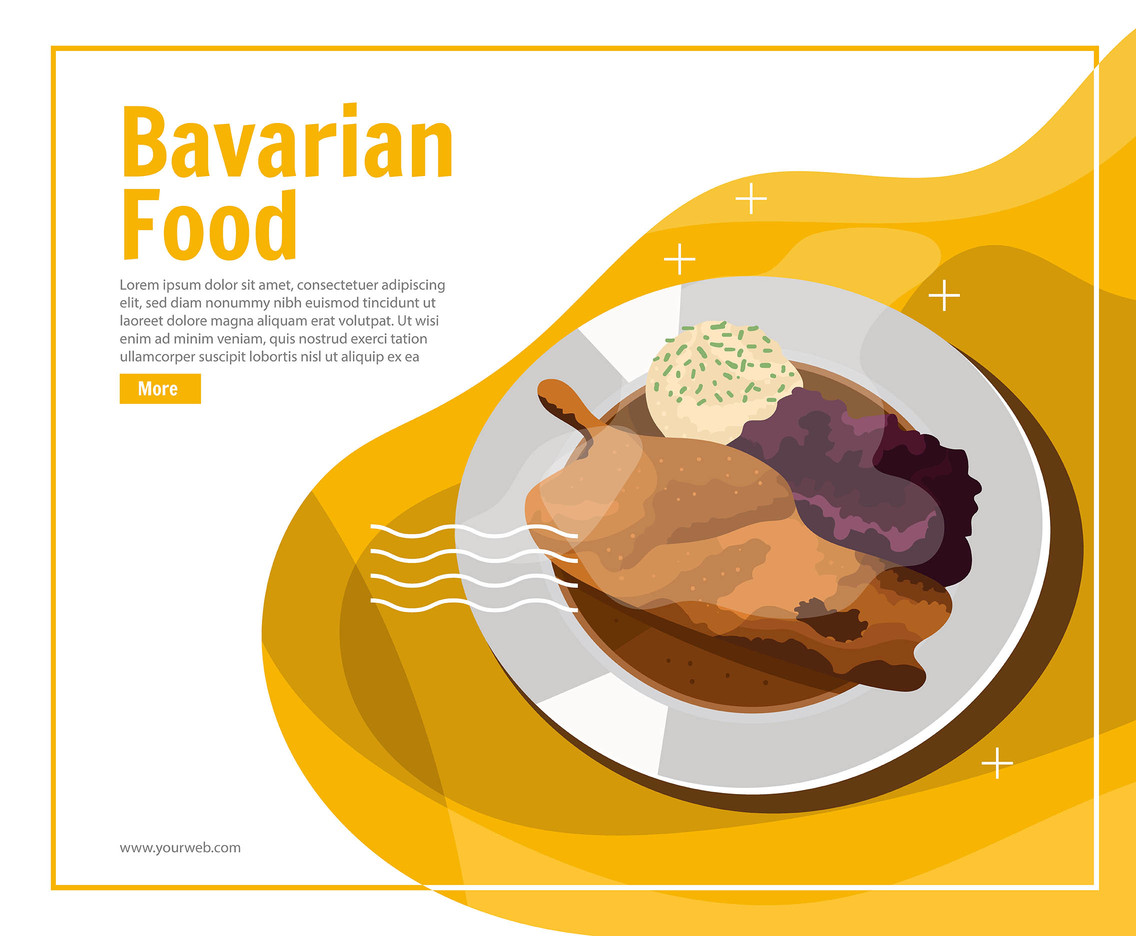Bavarian Food: Exploring The Rich Culinary Traditions Of Bavaria
When it comes to authentic European cuisine, Bavarian food stands out as a treasure trove of flavors and traditions that have been passed down through generations. Bavaria, Germany's largest state, is renowned for its hearty dishes, rich history, and unique culinary culture. Whether you're a food enthusiast or simply curious about the flavors of this region, Bavarian food offers an experience like no other.
Bavaria’s culinary landscape is deeply rooted in its geography, history, and cultural heritage. From the rolling hills to the majestic Alps, the region’s diverse environment has shaped its food culture over centuries. The local ingredients, traditional recipes, and seasonal influences create a dining experience that is both comforting and indulgent.
In this article, we will delve into the world of Bavarian food, exploring its key ingredients, signature dishes, cultural significance, and the role it plays in modern gastronomy. Whether you're planning a trip to Bavaria or simply looking to recreate these flavors in your own kitchen, this guide will provide you with everything you need to know.
Read also:How Much Money Does Lil Uzi Vert Have A Comprehensive Look At His Wealth And Career
Table of Contents
- The History of Bavarian Food
- Key Ingredients in Bavarian Cuisine
- Signature Bavarian Dishes
- Bavarian Food in Festivals
- Culinary Traditions of Bavaria
- Health Aspects of Bavarian Food
- Bavarian Food Around the World
- Easy Bavarian Recipes to Try at Home
- Top Bavarian Restaurants to Visit
- Conclusion
The History of Bavarian Food
Bavarian food has a long and storied history that dates back to the early Middle Ages. The region’s cuisine was heavily influenced by its location, climate, and historical interactions with neighboring countries. Bavaria’s fertile lands provided ample grains, dairy, and livestock, which became the foundation of its culinary traditions.
During the Renaissance, Bavaria experienced a culinary renaissance of its own, with the introduction of new ingredients and cooking techniques from Italy and France. This period saw the rise of dishes like Weißwurst (white sausage) and Kartoffelsalat (potato salad), which remain popular to this day.
Historical Influences on Bavarian Cuisine
The history of Bavarian food is closely tied to its political and social developments. The Bavarian monarchy played a significant role in promoting the region’s culinary arts, hosting grand feasts that showcased local specialties. Over time, these traditions trickled down to the common people, creating a shared cultural identity centered around food.
- Monastic influence: Monasteries in Bavaria were instrumental in developing beer brewing and cheese production.
- Trade routes: The region’s strategic location along trade routes introduced spices and exotic ingredients.
- Seasonal eating: Due to its harsh winters, Bavarians developed methods of preserving food, such as smoking and pickling.
Key Ingredients in Bavarian Cuisine
Bavarian food is characterized by its use of fresh, locally sourced ingredients. The region’s agricultural richness provides a bounty of produce, meats, and dairy products that form the backbone of its cuisine.
Some of the most important ingredients in Bavarian cooking include pork, veal, potatoes, barley, and hops. These ingredients are often combined in hearty stews, sausages, and bread-based dishes that reflect the region’s agricultural heritage.
Popular Bavarian Ingredients
- Pork: A staple in Bavarian cuisine, used in dishes like Schweinshaxe (roasted pork knuckle).
- Potatoes: Versatile and widely used in salads, soups, and side dishes.
- Barley: Used in brewing beer and making soups like Hendlbrühe.
- Hops: Essential for Bavarian beer production.
Signature Bavarian Dishes
No exploration of Bavarian food would be complete without discussing its signature dishes. From savory sausages to comforting soups, these meals are a testament to the region’s culinary expertise.
Read also:Tanya Actress Twilight Exploring Her Journey And Impact On Pop Culture
Must-Try Bavarian Dishes
- Weißwurst: A traditional Bavarian white sausage, often served with sweet mustard and pretzels.
- Schweinshaxe: Roasted pork knuckle, a favorite at festivals and celebrations.
- Kartoffelsalat: A tangy potato salad, often paired with sausages or grilled meats.
- Leberkäse: A baked loaf of ground meat, often served in thick slices.
Bavarian Food in Festivals
Festivals play a crucial role in celebrating Bavarian food and culture. Events like Oktoberfest attract millions of visitors each year, showcasing the region’s culinary traditions on a global stage.
During these festivals, traditional dishes are served alongside local beers, creating an atmosphere of joy and camaraderie. The emphasis on communal dining and shared experiences highlights the importance of food in Bavarian social life.
Oktoberfest and Its Culinary Traditions
Oktoberfest is perhaps the most famous festival associated with Bavarian food. Held annually in Munich, the event features a wide array of traditional dishes, including:
- Weißwurst
- Schweinshaxe
- Brezeln (pretzels)
- Hendl (roast chicken)
Culinary Traditions of Bavaria
Bavarian food is deeply tied to the region’s traditions and way of life. Many dishes are prepared using age-old methods passed down through generations, preserving the authenticity and flavor of the cuisine.
One of the most notable traditions is the emphasis on communal dining. Whether it’s a family gathering or a village festival, food in Bavaria is often enjoyed in the company of others, fostering a sense of unity and belonging.
Traditional Bavarian Eating Habits
- Breakfast: Often includes bread, butter, cheese, and cold cuts.
- Lunch: The main meal of the day, featuring hearty dishes like soups and stews.
- Dinner: Lighter fare, such as salads or simple sandwiches.
Health Aspects of Bavarian Food
While Bavarian food is known for its rich and indulgent flavors, it also offers several health benefits when consumed in moderation. Many traditional dishes incorporate wholesome ingredients like whole grains, vegetables, and lean meats, making them nutritious options.
However, it’s important to balance indulgence with mindful eating. Dishes like Weißwurst and Schweinshaxe are high in calories and fat, so portion control is key to enjoying them without compromising health.
Bavarian Food Around the World
Thanks to globalization, Bavarian food has gained popularity beyond its borders. Restaurants and breweries around the world now offer authentic Bavarian dishes, allowing food enthusiasts to experience the flavors of this region without traveling to Germany.
Chefs and food enthusiasts have also adapted Bavarian recipes to suit local tastes, creating fusion dishes that combine traditional elements with modern techniques. This global appreciation highlights the universal appeal of Bavarian cuisine.
Easy Bavarian Recipes to Try at Home
If you’re eager to recreate Bavarian flavors in your own kitchen, here are a few simple recipes to get you started:
Recipe for Kartoffelsalat
Ingredients:
- 4 medium potatoes
- 1/4 cup white wine vinegar
- 1/4 cup vegetable oil
- 2 tablespoons Dijon mustard
- 1 small onion, finely chopped
- Salt and pepper to taste
Instructions:
- Boil the potatoes until tender and let them cool.
- Whisk together vinegar, oil, mustard, and onion to make the dressing.
- Peel and dice the potatoes, then toss them with the dressing.
- Season with salt and pepper and serve chilled.
Top Bavarian Restaurants to Visit
For an authentic Bavarian dining experience, consider visiting some of the region’s top restaurants. These establishments not only serve delicious food but also offer a glimpse into the local culture and traditions.
Recommended Bavarian Restaurants
- Hofbräuhaus München: Famous for its beer and traditional Bavarian dishes.
- Ratskeller Augsburg: Located in a historic setting, offering a wide range of regional specialties.
- Bayerischer Hof: A luxury hotel restaurant known for its fine dining and Bavarian flair.
Conclusion
Bavarian food is a celebration of tradition, culture, and community. From its rich history to its diverse ingredients and signature dishes, this cuisine offers something for every palate. Whether you’re exploring the region’s culinary landscape in person or recreating its flavors at home, Bavarian food promises an unforgettable experience.
We invite you to share your thoughts and experiences in the comments below. Have you tried any Bavarian dishes? What’s your favorite? Don’t forget to explore more articles on our site for additional insights into the world of food and culture.

